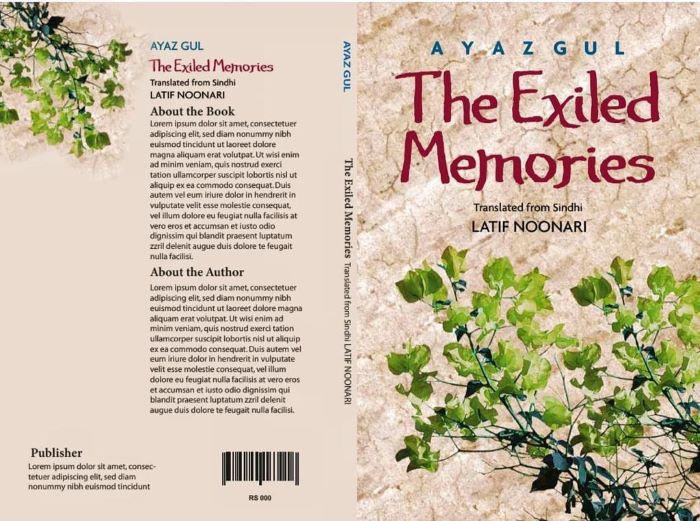
This is an important contribution to what is now a growing library of texts available for English-speaking readers as a way to gain access to Sindhi thought and Sindhi culture
Emily Hauze
I truly regret that I wasn’t able to come to Khairpur to attend the launch of Ayaz Gul’s poetry book ‘The Exiled Memories’, translated into English by Latif Noonari.

This is an important contribution to what is now a growing library of texts available for English-speaking readers as a way to gain access to Sindhi thought and Sindhi culture, which is very much needed to spread these peaceful notions across the world. I find this book to be a particularly poignant vessel for bringing these ideas to new readers because Ada Ayaz is a master of traditional forms as well as a modern Sindhi poetic form, all of which feel very fresh in his pen. Partially beautiful, I think, are his Ghazals in which striking couplets are linked by a word or phrase, which word, in turn, becomes transformed as it links one couplet to the next, transformed into a new pearl of insight in each couplet.
The subject matter in this work combines elements that are familiar or classical with quite new and thoughtful commentaries on modern life. He moves smoothly between modes of speech and time frames. A good example of this is the title poem, which is called The Exiled Memories. This is a little selection from that poem:
Neither you nor I look the same
The eyes are the same but
There dwells a wilderness in them
A stranger stunned in an alien land
Few sentences seem recorded on tongues:
“How are you?
Where and how are you?
Still writing?
Haven’t read you since long!”
Here we can see this elegant motion between the very abstract world of poetry and the concrete details of daily life, a motion from the broadness of great ideas to the intimate realities of modern life.
Ayaz Gul addresses conditions specific to modern Sindh and contemporary life.
It’s unusual for a book of poetry to be a page-turner, and yet, this is what Ayaz Gul has achieved in this. One gripping poem leads to the next in such a way that one doesn’t want to stop the flow of attention-grabbing and heart-touching images.
A few lines will readily illustrate what I mean, for example this couplet from a poem entitled Every Moment is like Fire:
“The tear trapped in the eye-corner
Is like on the door the doorman.”
It is a beautiful image of a tear as a guardian of the emotions inside the eye. And similarly striking are the first lines of a poem called Without You:
“Each moment seems like a bullet,
Seems like a gang of enemies.”
With such a vibrant array of images, Gul’s verse pulls the reader deep into his poetic world.
The themes of the work are in many cases the timeless and traditional themes of Sindhi poetry: love, loss, separation, and isolation. Interspersed with these, however, Ayaz Gul addresses conditions specific to modern Sindh and contemporary life. He does not shy away from the perpetual difficulties of his land, the pall of oppression and corruption that overshadows its greatness. These sorrows also find their voice in Gul’s poetry, but, crucially, he doesn’t succumb to despair. He does not predict ultimate devastation, but rather guides the mind toward a persistent ray of hope. This can be seen, for example, in the poem entitled I am Eternal:
“Of the dark room
A skylight I am
Death, you never can kill!”
English-speaking readers will recognize echoes in these lines with the familiar Biblical lines:
“Death. Where is thy sting?
Hell, where is thy victory?”
Ayaz Gul’s own line, “Death, you never can kill,” links into an ancient and global idea of hope for the triumph of good over evil, of the will to live over despair.
And another verse that evokes this theme has the emotionally urgent title, Still, It’s Our Time, Our Era: a phrase which demands that we recognize our own place in this universe. It is a poem for those moments when we feel that the world is somehow getting away from us, that time is slipping by, that we no longer relate to what’s going on around us, or no longer have control or even interest in current affairs. The verse is a reminder that we are still responsible: this is not someone else’s time, or someone else’s problem, but our own time. It is a call to life in the present, and it is deeply encouraging:
“The blaze of wisdom still remains alight
Still the sun comes to kill the night!”
The beauty of the translation must also be mentioned, as it is an essential element of the book’s success. Translator Latif Noonari has elegantly rendered Gul’s poetry into clear and lucid English, without its Sindhi flavor. As such, this volume is well poised to intrigue and delight readers wherever it reaches, and I hope that its reach will be far and wide. And I want to give you all my friends, my warmest wishes, from the United States here. I wish you a Merry Christmas and I wish you all a happy New Year. My best to all of you. Saddaeen gadd’u!
_____________
 Emily Hauze is a traveler, writer, translator, and photographer, who feels her greatest honor is to be called the “Amriki Sindhiani” by her Sindhi friends. She received her education in the fields of Music (bachelor’s degree) and German Literature (Bachelor’s and Master’s degrees). During her time as a graduate student studying German literature, she presented a paper at a national academic conference, organized a conference of her own, and published two papers in academic journals. Later she went to work in broadcast media, working as an assistant in public television and radio. In recent years, however, learning about Sindhi culture has been her primary endeavor. She has visited Sindh 12 times since 2015, with particular interest in historic sites and traditional ways of life. She does not consider this travel to be ‘tourism,’ but rather a kind of homecoming. She has written a blog (https://www.emilyhauze.com/blog) that covers many experiences in her first several trips to Sindh, which she hopes will soon be published in book form. She is an ardent student of the Sindhi language, especially in writing, and she has begun a project to translate Shah Abdul Latif’s Risalo in its entirety into English verse. She shares her translations with a wide public, both Eastern and Western, and aims to bring Shah Latif to new audiences. She is always on the lookout for ways to use her skills and devotion for the benefit of Sindh.
Emily Hauze is a traveler, writer, translator, and photographer, who feels her greatest honor is to be called the “Amriki Sindhiani” by her Sindhi friends. She received her education in the fields of Music (bachelor’s degree) and German Literature (Bachelor’s and Master’s degrees). During her time as a graduate student studying German literature, she presented a paper at a national academic conference, organized a conference of her own, and published two papers in academic journals. Later she went to work in broadcast media, working as an assistant in public television and radio. In recent years, however, learning about Sindhi culture has been her primary endeavor. She has visited Sindh 12 times since 2015, with particular interest in historic sites and traditional ways of life. She does not consider this travel to be ‘tourism,’ but rather a kind of homecoming. She has written a blog (https://www.emilyhauze.com/blog) that covers many experiences in her first several trips to Sindh, which she hopes will soon be published in book form. She is an ardent student of the Sindhi language, especially in writing, and she has begun a project to translate Shah Abdul Latif’s Risalo in its entirety into English verse. She shares her translations with a wide public, both Eastern and Western, and aims to bring Shah Latif to new audiences. She is always on the lookout for ways to use her skills and devotion for the benefit of Sindh.